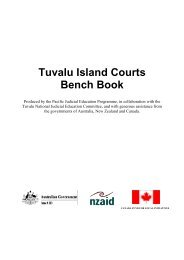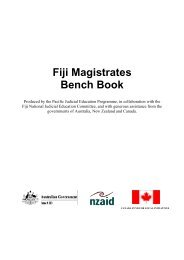Part 7 Interlocutory Matters - PacLII
Part 7 Interlocutory Matters - PacLII
Part 7 Interlocutory Matters - PacLII
Create successful ePaper yourself
Turn your PDF publications into a flip-book with our unique Google optimized e-Paper software.
<strong>Part</strong> 7<br />
_____________________________________________________________________________________________<br />
(iii) the assets are likely to be removed from Vanuatu, or<br />
dealing with them should be restrained.<br />
[7.8.16] Extent of likelihood The applicant must show that refusal would pose a real risk<br />
that the defendant’s actions would result in the judgment being unsatisfied: Ninemia<br />
Maritime v Trave Schiffahrtsgesellschaft [1983] 1 WLR 1412 at 1422; [1984] 1 All ER<br />
398 at 419. The strength of the likelihood informs the strength of the application.<br />
[7.8.17] Subjective fear insufficient A claimant cannot obtain an order merely because<br />
he fears there will be nothing against which he can enforce judgment or to secure his<br />
position against other creditors – the purpose of a freezing order is only to prevent<br />
against abuse of process by the frustration of the court’s remedies: Jackson v Sterling<br />
Industries (1987) 162 CLR 612 at 625; 61 ALJR 332 at 337; 71 ALR 457 at 465.<br />
[7.8.18] Form of order The order will commonly restrain a party from transferring assets<br />
abroad and from dealing with them locally, regardless of which risk was the basis of the<br />
application: AJ Bekhor & Co Ltd v Bilton [1981] QB 923 at 926; Z v A-Z [1982] QB 558<br />
at 585; [1982] 1 All ER 556 at 571-2; [1982] 2 WLR 288 at 306; [1982] 1 Lloyd’s Rep<br />
240 at 251.<br />
[7.8.19] Order interlocutory in nature A freezing order will usually be regarded as<br />
interlocutory, as opposed to a permanent injunction: Siskina & Ors v Distos Compania<br />
Naviera SA [1979] AC 210 at 253.<br />
(5) The application must:<br />
[7.8.20] Requirement of full disclosure An applicant is under a duty to make full and<br />
frank disclosure of all material facts known to him and to make proper inquiries before<br />
applying. The provisions of this subrule and subrule (6) are generally reflective of the<br />
requirements laid down by the authorities: see generally R v General Commissioners<br />
For Income Tax For Kensington [1917] 1 KB 486 at 506; Third Chandris v Unimarine<br />
[1979] QB 645 at 668-9; [1979] 2 All ER 972 at 984-5; [1979] 3 WLR 122 at 137-8;<br />
[1979] 2 Lloyd’s Rep 184 at 189; Brinks-MAT v Elcombe [1988] 3 All ER 188; [1988] 1<br />
WLR 1350; Dormeuil Freres v Nicolian [1988] 3 All ER 197; [1988] 1 WLR 1362;<br />
Lloyd’s Bowmaker v Britannia Arrow Holdings [1988] 3 All ER 178 at 181-2; [1988] 1<br />
WLR 1337 at 1342-3; Manor Electronics v Dickson [1988] RPC 618; (1990) 140 NLJ<br />
590 (applicant in financial difficulties); Behbehani v Salem [1989] 1 WLR 723; [1989] 2<br />
All ER 143 (disclosure of existing or contemplated proceedings elsewhere).<br />
(a) describe the assets and their value and location; and<br />
[7.8.21] Foreign assets There is no reason why the order cannot be directed to assets<br />
located outside Vanuatu: Derby v Weldon (Nos 3 & 4) [1990] Ch 65; [1989] 2 WLR 412;<br />
National Australia Bank v Dessau [1988] VR 521.<br />
[7.8.22] Scope of order The requirement to describe known assets and location does not<br />
mean that the order will necessarily be confined to these. The order may be drawn to<br />
have an ambulatory effect, attaching to such assets as the party may have from time to<br />
time: TDK Tape v Videochoice [1986] 1 WLR 141 at 145; [1985] 3 All ER 345 at 349.<br />
(b) include the name and address of the owner of the assets, if<br />
known, and the identity of anyone else who may be affected<br />
by the order and how they may be affected; and<br />
[7.8.23] Extent of applicant’s knowledge It is not fatal to an application that the<br />
applicant has little or no knowledge of circumstances particular to others or that, with<br />
greater effort, it could have discovered more: Commr of State Taxation (WA) v Mechold<br />
(1995) 30 ATR 69 at 74; 95 ATC 4053 at 4058.<br />
(c) if a proceeding has not been started, set out:<br />
(i) the name and address of anyone else likely to be a<br />
defendant; and<br />
(ii) the basis of the applicant’s claim; and<br />
issue 3 92

















